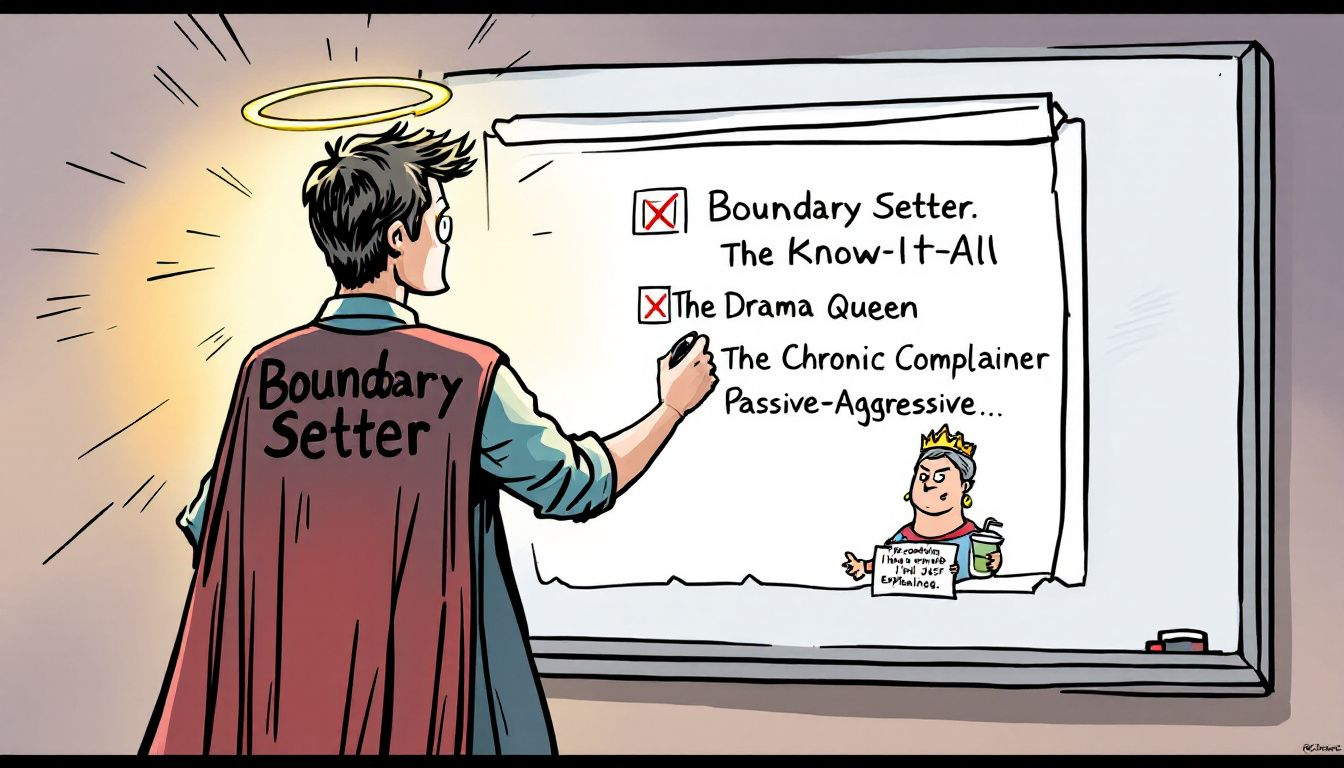5 Effective Strategies on How to Manage Difficult People
Struggling with difficult people? Learn how to manage difficult people with practical strategies to identify their traits, communicate effectively, set boundaries, and seek support when needed.
Key Takeaways
Identify traits of difficult people to manage interactions effectively and prevent issues from escalating.
Utilize effective communication techniques like staying calm, actively listening, and setting clear boundaries to foster healthier interactions.
Focus on solutions rather than problems, encouraging positive change and employing self-awareness to manage emotional responses.
Recognize the Traits of Difficult People
Recognizing the traits of difficult people is crucial for effective management. These individuals often lack empathy and concern for others, making interactions challenging. They may be unaware of their negative impact and sometimes derive satisfaction from creating problems. Traits such as callousness, grandiosity, and aggressiveness can manifest in different ways.
In the workplace, difficult individuals can appear as bullies, gossipers, and poor team players. They may take credit for others’ work, blame others, and engage in combative behavior, disrupting the work environment and creating a toxic atmosphere. Identifying these traits early allows for intervention before issues escalate.
Recognizing a difficult person can be challenging because their behaviors may vary depending on specific situations. Understanding these characteristics helps in preparing to handle and leading difficult people in various contexts and a person’s behavior in particular.
Effective Communication Techniques
Effective communication is vital when dealing with a difficult situation involving difficult individuals. Poor communication skills can worsen challenging situations, making it important to employ the right strategies.
Focusing on staying calm, actively listening, and avoiding defensive reactions helps navigate difficult conversations more effectively.
Stay Calm and Collected
Remaining calm when dealing with difficult people demonstrates control and can earn respect. To remain calm equips you to handle the situation without escalating it, fostering a more positive environment.
Avoid knee-jerk reactions and impulsive responses. When provoked, remain composed and respond in a measured manner. Taking a deep breath and providing a considered response shows emotional maturity and helps deescalate the situation.
Active Listening
Active listening is key to effective communication with difficult people. Genuinely listening to their concerns helps understand their perspective and respond appropriately, diffusing tension and fostering mutual respect.
Expressing authentic curiosity in someone’s feelings fosters more cooperative interactions. Demonstrating genuine interest creates an environment where both parties feel heard and valued, improving the quality of the conversation and leading to more productive outcomes.
Avoid Defensive Reactions
Avoiding defensive reactions allows you to consider the situation objectively and find the best course of action. Dissociating the person from their behavior during criticism reduces the personal impact and keeps the conversation constructive, allowing for a better understanding of a person’s point.
Responding with anger or mockery can escalate the situation. Instead, listen to your intuition and act accordingly. Avoid judgment, negativity, or finger-pointing to create a more constructive communication atmosphere.
Setting Boundaries and Limits
Setting boundaries is key to maintaining respectful interactions and preventing conflicts. Defining and enforcing clear boundaries creates a healthier environment for everyone involved. This process begins with self-awareness and understanding the impact of your behavior on others.
Define Clear Boundaries
Establishing clear boundaries is essential when dealing with difficult people. Before a difficult conversation, set standards of behavior, such as respectful listening. Communicate your expectations and make it clear that you will not accept anything less. This clarity sets the tone for healthier interactions.
If a difficult person cannot respect your boundaries, further action may be necessary. Documenting instances of disrespectful behavior can support your conversation with management and substantiate your concerns.
Enforce Boundaries Consistently
Communicating limits clearly is important, but without consistency in enforcing them, boundaries may not be respected. Consistently enforcing boundaries fosters respect and creates a healthier environment for interactions. Without consistency, the risk of boundary violations increases, leading to potential conflict.
Failing to uphold consequences for boundary violations can undermine your authority and respect for those boundaries. Therefore, it’s crucial to be firm and consistent in enforcing the limits you set.
Seeking Support When Necessary
Knowing when to seek support can help manage difficult situations more effectively. When all else fails or when you’re unsure how to proceed, reaching out for support can provide new insights and solutions.
Identify Trusted Confidants
Confiding in trustworthy individuals can provide emotional support and practical advice during difficult interactions. Trusted confidants offer a fresh perspective and help navigate challenging situations more effectively.
Escalate Issues Appropriately
Escalate issues with difficult individuals after all other options have been exhausted or if the behavior becomes dangerous. The purpose of escalation is to address unresolved problems after all other solutions have been attempted. If other approaches fail, talk to your manager or boss about the situation. Clearly communicate what is bothering you and why the behavior is unacceptable.
Knowing when to escalate issues is crucial for maintaining a productive work environment. Escalating appropriately ensures that the problem is addressed and resolved effectively.
Focus on Solutions, Not Problems
Focusing on solutions rather than dwelling on problems is crucial when managing difficult people. Concentrating on what you can control helps lead difficult people and navigate conflicts more effectively, steering the interaction towards a positive outcome.
Problem-Solving Approach
A problem-solving approach involves asking extensive questions to understand the other side’s motives during conflicts. When someone tells you ‘no,’ consider it a starting point for negotiation. Focusing on what can be controlled steers the conversation towards constructive outcomes.
Once you understand what the person wants, be clear about whether you can comply with their requests. This clarity helps find mutually agreeable solutions and resolve conflicts effectively.
Encourage Positive Change
Encouraging positive change in difficult individuals involves providing constructive feedback. This feedback can motivate them to alter negative behaviors and contribute to a more positive environment.
Achieving resolution is essential to move past difficult situations and foster progress.
Self-Awareness and Emotional Management
Self-awareness and emotional management are crucial in handling difficult people. Understanding your own emotional triggers helps manage responses and maintain control.
Practice Self-Reflection
Practicing self-reflection involves examining how your behaviors are perceived by others and assessing if you’re contributing to the problem. Avoid thinking about what you’re going to say next while listening to a difficult person. Instead, be curious and learn about their perspective.
After successfully navigating a challenging situation, give yourself credit for your efforts. Discussing your experiences with a trusted person helps process and reflect.
Manage Emotions Effectively
Managing emotions effectively involves using structured techniques to maintain control and composure. Practical strategies, such as breathing techniques, help manage emotional responses in tense situations. Remaining calm enables handling challenging personalities more effectively.
Building Empathy and Understanding
Building empathy and understanding is key to managing difficult people. Empathy allows you to connect deeply with others’ emotions, fostering better relationships and reducing tension.
Show Genuine Interest
Showing genuine interest in a person’s concerns and feelings establishes a positive starting point for interaction. Demonstrating interest can motivate a difficult individual to treat you with respect in return.
Find Common Ground
Finding common ground involves shifting focus from problematic behavior to constructive solutions. Identifying shared goals and using empathy to understand the underlying causes of difficult behavior can significantly reduce conflict.
Combining these strategies fosters positive outcomes in challenging interactions.
Summary
Summarize the key points of the article, reiterating the importance of recognizing traits, effective communication, setting boundaries, seeking support, focusing on solutions, self-awareness, and building empathy. End with an inspirational note, encouraging readers to apply these strategies in their lives.
Frequently Asked Questions
How can I recognize a difficult person?
You can recognize a difficult person by their lack of empathy and their tendency to create problems, often showing traits like aggressiveness and callousness. If they seem to thrive on conflict, it's a clear sign.
What are some effective communication techniques for dealing with difficult people?
When dealing with difficult people, staying calm and practicing active listening are key. Avoiding defensive reactions can really help in maintaining a constructive conversation.
Why is setting boundaries important when dealing with difficult people?
Setting boundaries is crucial for maintaining respectful interactions and minimizing conflicts with difficult people. It helps you define clear expectations and consequences, allowing for healthier relationships.
When should I seek support in managing difficult people?
You should seek support when your strategies aren't working or if you're feeling overwhelmed. Having a trusted confidant can really help you gain perspective and navigate the situation.
How can I encourage positive change in a difficult person?
To encourage positive change in a difficult person, offer constructive feedback and emphasize solutions. This approach can motivate them to shift their negative behaviors and foster a more positive atmosphere.





